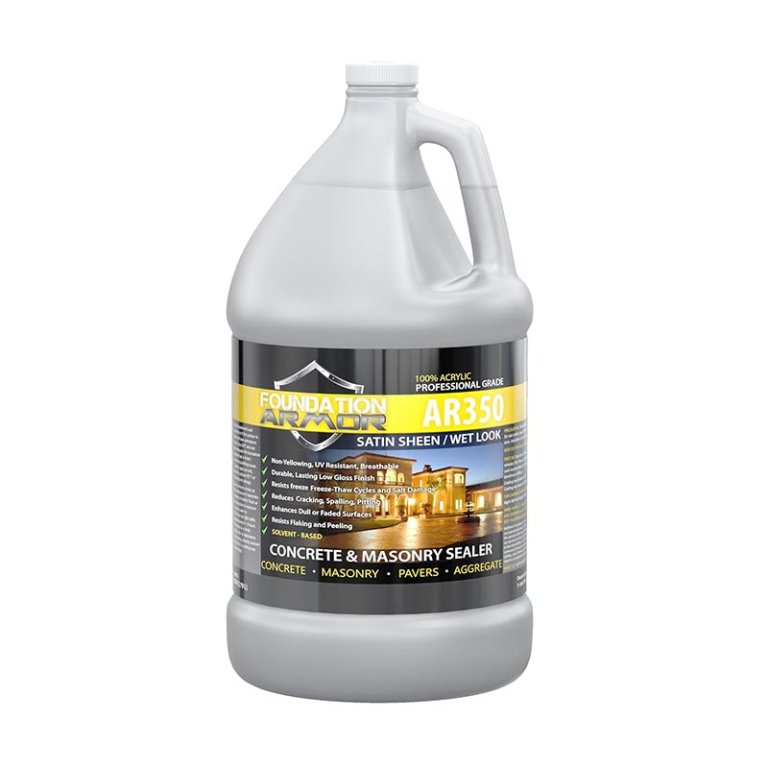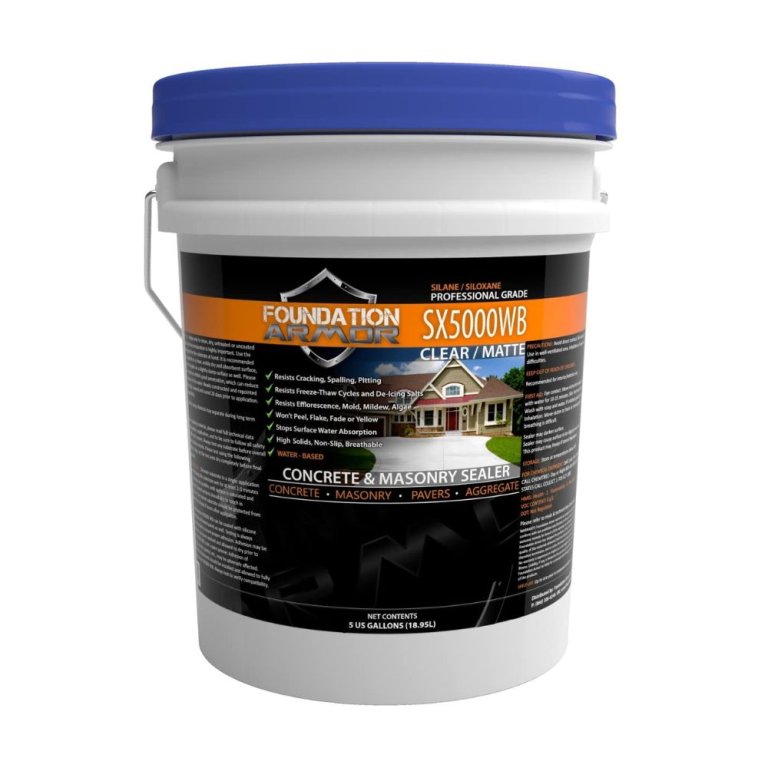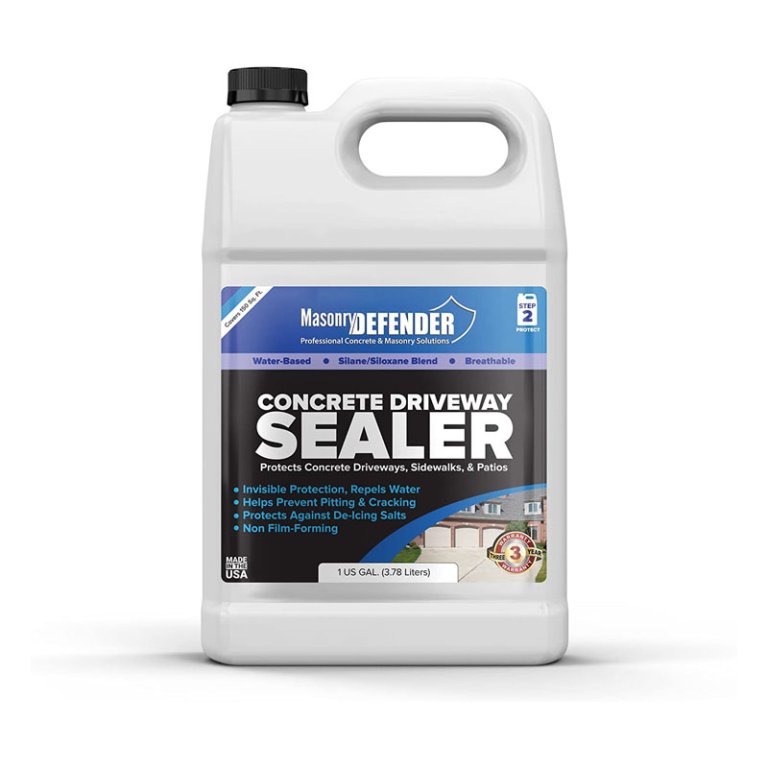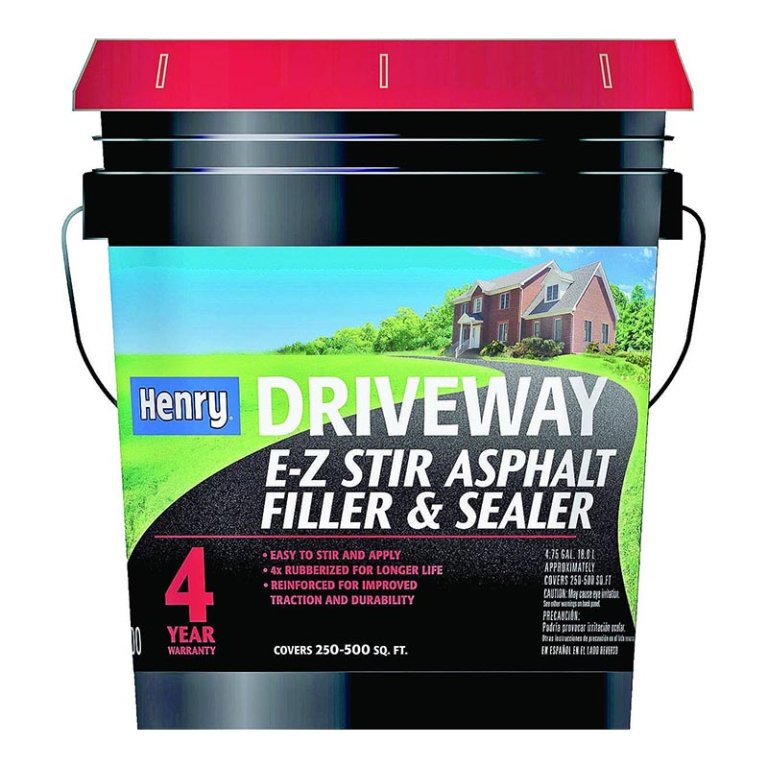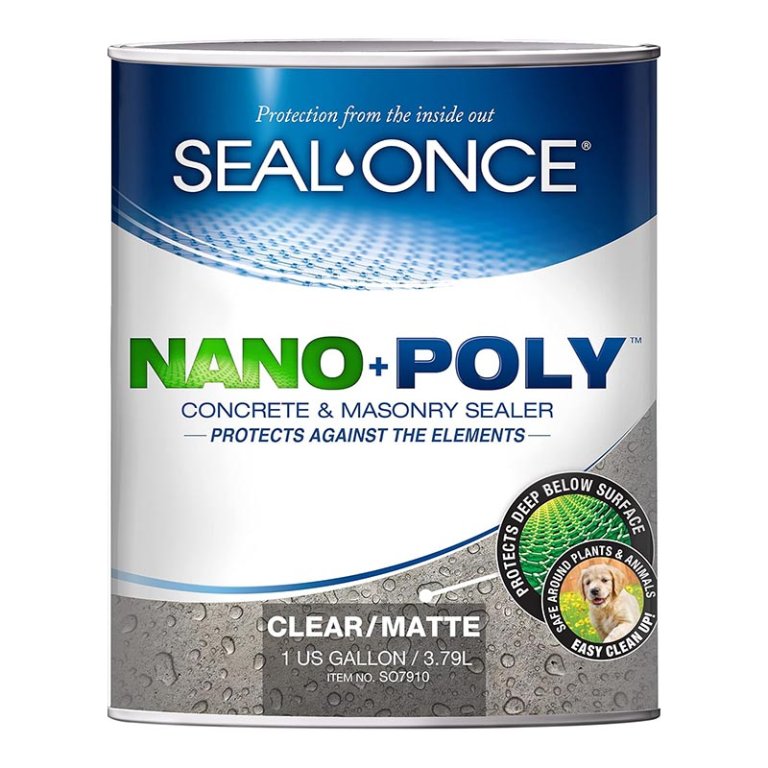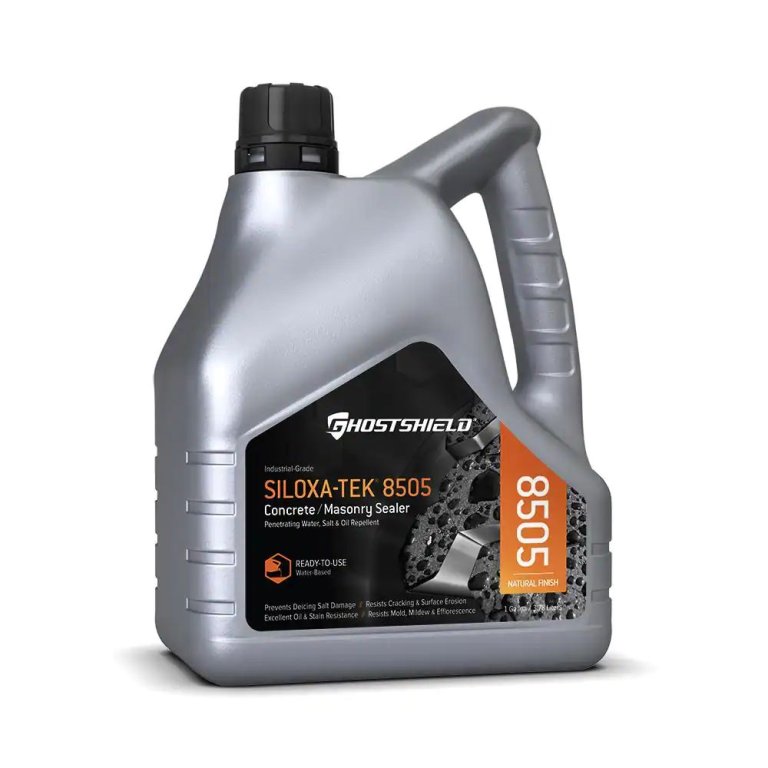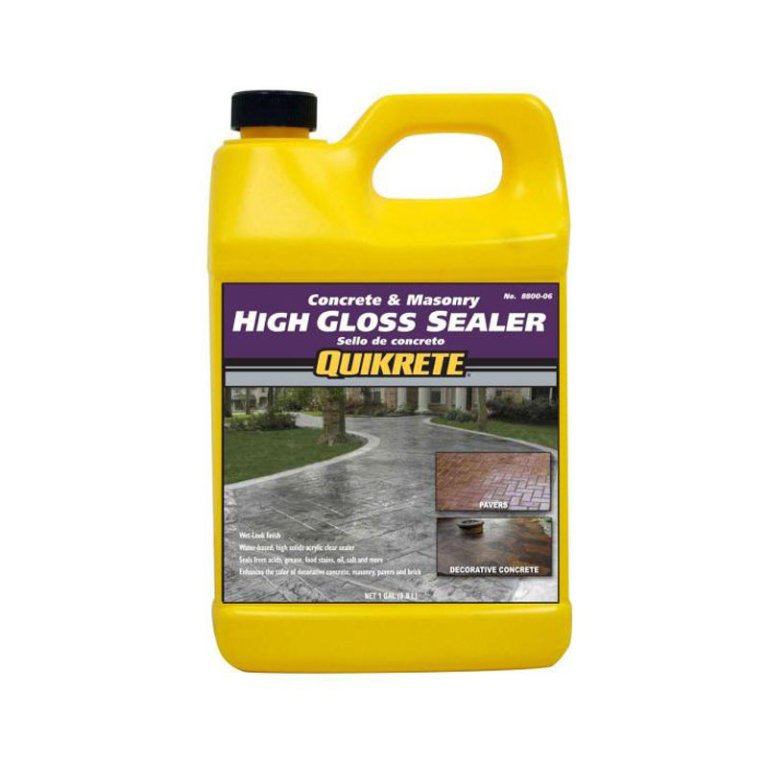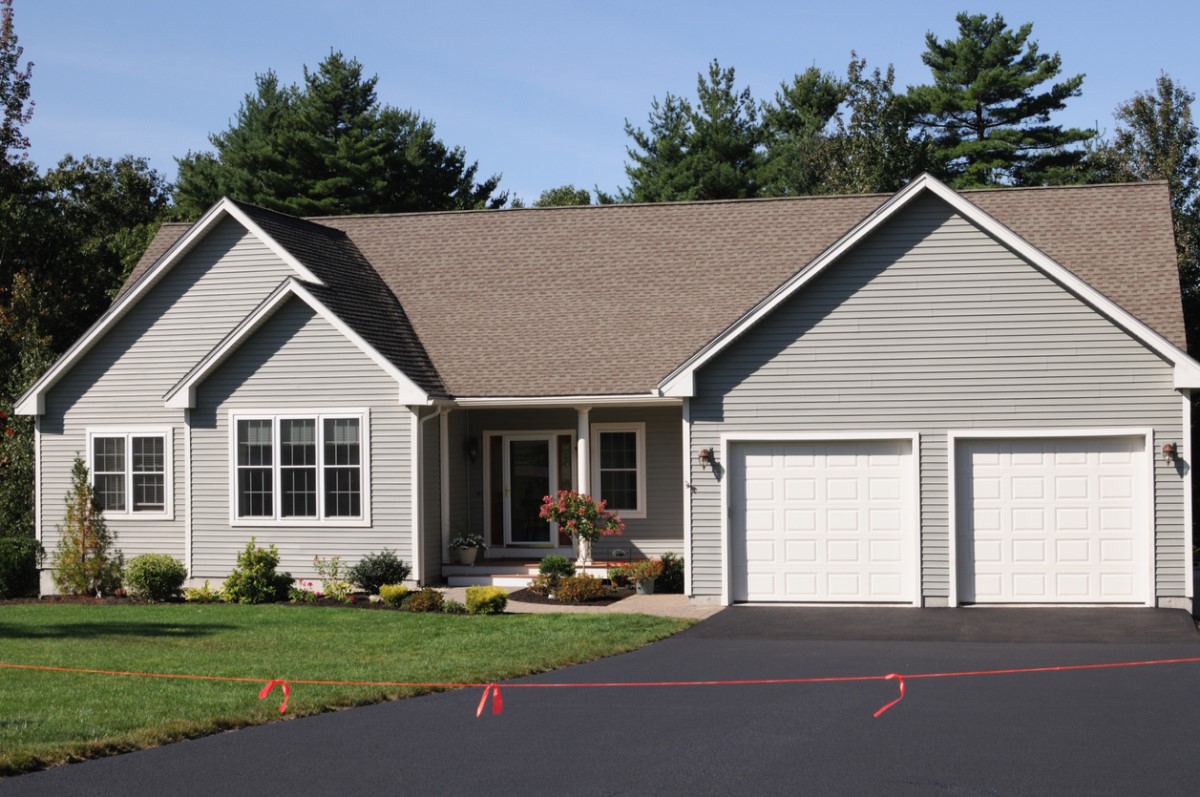
We may earn revenue from the products available on this page and participate in affiliate programs. Learn More ›
Cracked or stained driveways detract from curb appeal, so keeping your driveway looking its best can help protect the investment in your home. By treating your driveway with the best driveway sealer, you can protect the surface from freeze-thaw cycles, chemicals, and harsh ultraviolet (UV) rays.
While installing a driveway is a job for the pros, sealing a driveway that’s concrete or asphalt can be a simple DIY project. The best sealer will vary depending on the individual driveway’s condition and the reason for sealing it. Plus, some of the best driveway sealers can also be used with other driveway surfaces like pavers, flagstone, and masonry.
We chose the Foundation Armor AR350 Wet Look as our best overall pick for its versatile, solvent-based formula; nonyellowing, self-leveling, and breathable texture; and 3- to 10-year longevity.
Read on to learn about more concrete and asphalt sealers, and find out why the following products are among the best you can buy. Plus, we hands-on tested some of our selected picks to make sure they performed well.
- BEST OVERALL: Foundation Armor AR350 Wet Look Concrete Sealer
↓ Jump to Review - RUNNER-UP: Foundation Armor SX5000 WB Concrete & Masonry Sealer
↓ Jump to Review - BEST BANG FOR THE BUCK: MasonryDefender Concrete Driveway Sealer
↓ Jump to Review - BEST FOR CRACKED ASPHALT: Henry E-Z Stir Asphalt Filler & Sealer
↓ Jump to Review - BEST LONG-LASTING: Seal-Once Nano + Poly Concrete & Masonry Sealer
↓ Jump to Review - BEST FOR FRESH CONCRETE: Quikrete Acrylic Concrete Cure & Seal
↓ Jump to Review - BEST MOLD-INHIBITING: GhostShield Siloxa-Tek 8505 Concrete & Masonry Sealer
↓ Jump to Review - BEST FOR A WET LOOK: Quikrete Concrete & Masonry High Gloss Sealer
↓ Jump to Review - BEST SOLVENT-BASED: Foundation Armor SX5000 Concrete & Masonry Sealer
↓ Jump to Review

How We Chose the Best Driveway Sealers
Weather, oil, gasoline, and ice-melt products can tarnish a driveway, giving it a shabby look. Selections for our Top Picks of the best driveway sealers on the market depended upon compatibility with different surfaces, value per quantity, durability, ease of application, and longevity.
Though most of the sealers listed above are made for asphalt or concrete driveways, some are also compatible with other surfaces like brick, flagstone, pavers, masonry, and more. Some are also safe for indoor projects like basement flooring.
Sealers featured on the list also come in quantities of up to 5 gallons to cover areas of up to 500 square feet. For smaller driveways, there are also 1-gallon quantities available that can cover about 200 square feet.
Resistance to oils, gasoline, salt, ice-melt products, and other common stains is also a valuable asset in many top sealers. As for application, most of our picks require two coats for ample durability. But, with multiple sealer coats comes ample longevity of 5 to 10 years.
Our Top Picks
The following sealers for concrete and asphalt driveways are all well suited to various needs. We also tested four of our selected picks to ensure they provided excellent protection against moisture, mold, mildew, and sun damage. Coverage varies by product and the type of sealer. If you want to apply the recommended two coats for some of the sealers, be sure to purchase enough to coat the driveway twice.
Best Overall
Foundation Armor AR350 Wet Look Concrete Sealer
What We Like
- Durable, nonyellowing, self-leveling formula last for 3 to 7 years
- Can be applied in indoor or outdoor spaces, including garages, pool decks, basements, walkways, and more
- Low-gloss finish dries to the touch in seconds and fully cures in up to 24 hours
- Provides ample coverage area of 175 to 225 square feet
What We Don’t Like
- Requires at least 2 coats to provide a full seal over concrete
- Low-gloss appearance may differ depending on the surface type and porosity
Product Specs
- Surface compatibility: Concrete, clay brick, pavers, flagstone, slate, and natural stone
- Coverage: 175 to 225 square feet/gallon
- Finish: Glossy
Our Best Overall spot goes to the Foundation Armor AR350 concrete sealer for its solvent-based, nonyellowing, self-leveling, and breathable formula that dries to the touch in seconds and fully cures in 24 hours. This sealer dries with a low-gloss finish that lasts through all weather conditions if used outdoors, but it can be used indoors if desired.
The sealer covers up to 175 square feet of porous surfaces and 225 square feet of smooth surfaces. It lasts up to 3 years before users will need to apply a new coat outdoors and up to 7 years if used indoors. It can be applied with a nap roller or a commercial pump sprayer. Keep in mind that this option’s glossy appearance can vary depending on the surface type, porosity, and number of coats.
What our tester says: Glenda Taylor, Bob Vila staff writer and product tester, notes in The Best Concrete Sealers that “it went on smoothly and self-leveled within seconds to form a uniform coating. In 24 hours, it was completely dry, yet it retained a hint of sheen, giving it an attractive finish that gave depth and richness without changing the color of the concrete. At the end of the testing period, we power-washed the paver, let it dry, and inspected it carefully. The AR350 came through with flying colors. The finish on this Foundation sealer still looked fresh, and there were no signs of staining, dulling, or peeling. Water beaded rather than soaked into the surface.”
Get the Foundation Armor AR350 driveway sealer at Amazon, Lowe’s, The Home Depot (5 gallons), or Walmart (5 gallons).
Runner-Up
Foundation Armor SX5000 WB Concrete & Masonry Sealer
What We Like
- Large quantity easily covers long or large driveways of up to 225 square feet
- Siliconate formula protects against salt and moisture damage; excellent longevity
- Resists mold and mildew buildup; great for most outdoor environments
What We Don’t Like
- Requires multiple coats for best results; can be quite time-consuming
Product Specs
- Surface compatibility: Concrete, clay brick, slate, flagstone, masonry, and natural stone
- Coverage: 175 to 225 square feet/gallon
- Finish: Natural
To reduce the risk of damage or deterioration to a concrete driveway caused by moisture and temperature extremes, check out Foundation Armor’s water-based sealer. Two coats, applied with a pump sprayer, can protect the surface for 7 to 10 years without changing the look of the driveway. This sealer is suitable for use on clay brick, flagstone, slate, masonry, and natural stone surfaces as well as concrete. Plus, it is resistant to moisture, salt, and mildew.
The Foundation Armor sealer comes in a 5-gallon container. One gallon will cover up to 175 square feet of porous surfaces and up to 225 square feet of smooth surfaces, and the whole barrel can treat approximately 435 square feet with two complete coats. The sealer will not make the driveway surface slick, and it applies with a clear, matte, and natural look.
Get the Foundation Armor SX5000 WB driveway sealer at Amazon, The Home Depot, or Walmart.
Best Bang for the Buck
MasonryDefender Concrete Driveway Sealer
What We Like
- Protects against chemical damage from de-icing salts and moisture
- Only requires 1 coat; simple application process with a relatively quick 6-hour dry time
- Breathable formula will not form a film or yellow with use
- Budget-friendly sealer compared to similar options
What We Don’t Like
- Driveway must be cleaned thoroughly before application
- Air temperature needs to be between 40 and 100 degrees Fahrenheit for at least 3 hours after application
- Discoloration may occur if applied on dense surfaces
Product Specs
- Surface compatibility: Concrete
- Coverage: 90 to 150 square feet/gallon
- Finish: Clear
For robust, comprehensive protection against weather-related damage, such as cracking and pitting, consider MasonryDefender concrete sealer. This affordable sealer also protects concrete against chemical damage caused from frequent use of ice melt–type products that can lead to cracking or surface peeling. The 1-gallon jug can treat up to 150 square feet of concrete.
For the best results, the driveway must first be thoroughly cleaned to remove dirt, dust, and spills. (The brand recommends using its All Purpose Masonry & Concrete Cleaner.) Apply a single coat of MasonryDefender with a pump-type sprayer. A second coat isn’t necessary to create a water- and chemical-resistant surface that will protect the driveway for up to 5 years.
What our tester says: Glenda Taylor, Bob Vila staff writer and product tester, notes in our tested guide that “we brushed MasonryDefender on half of the paver and sprayed it on the other half. It went on easily and quickly penetrated the surface. After 24 hours, we moved the paver outdoors to weather the elements, and we applied grease, mud, ice melt, and sand. After 3½ weeks, we power-washed the paver and allowed it to dry. We didn’t see any staining. We then poured a spoonful of water on the surface, which beaded up on top of the paver, proving that MasonryDefender was still repelling water.”
Get the MasonryDefender driveway sealer at Amazon.
Best for Cracked Asphalt
Henry E-Z Stir Asphalt Filler & Sealer
What We Like
- 4X rubberized formula provides traction and durability; suitable for use in commercial spaces
- Versatile formula can seal a driveway or fill small cracks up to ⅛-inch wide
- 5-gallon asphalt sealer provides enough product for up to 500 square feet
- 4-hour dry time; fully cures within 48 hours into a black, smooth finish
What We Don’t Like
- Color will only blend with asphalt (blacktop) surfaces
- Store where it cannot freeze or be reached by children
Product Specs
- Surface compatibility: Asphalt
- Coverage: 250 to 500 square feet/5 gallons
- Finish: Black
For an asphalt driveway that is prone to cracking, the Henry E-Z Stir filler/sealer can be a quick and permanent solution. This 4X rubberized 5-gallon asphalt sealer enhances traction and durability while filling cracks up to ⅛-inch wide. Simply mix and apply one coat with a squeegee or brush, then wait 4 hours for it to dry to the touch. For full curing, wait for 24 to 48 hours before driving on the surface.
Since this asphalt sealer/filler is black, it is best used on up to 500 square feet of asphalt (blacktop) only. The only downside with this 5-gallon asphalt sealer is that the brand does not disclose how long this filler/sealer will last.
Get the Henry driveway sealer at Amazon or Ace Hardware.
Best Long-Lasting
Seal-Once Nano + Poly Concrete & Masonry Sealer
What We Like
- Eco-friendly, water-based formula is safe to use around wildlife, children, and pets
- Will not crack, yellow, grow mold or mildew, or spall from UV light or freezing temperatures
- Provides a coverage area of 250 to 350 square feet per gallon and lasts for 6 to 10 years
What We Don’t Like
- Not suitable for use on garage floors or concrete driveways
Product Specs
- Surface compatibility: Concrete, pool decks, stamped concrete, bricks, and pavers
- Coverage: 250 to 350 square feet/gallon
- Finish: Matte
Nanotechnology and polyurethane come together to provide complete protection for concrete, stamped concrete, bricks, pavers, and even pool decks in this concrete and masonry sealer from Seal-Once. This water-based nontoxic penetrating formula provides 250 to 350 square feet of coverage; prevents the growth of mold and mildew; and resists cracking, yellowing, spalling, and damage from the sun and freezing temperatures.
This product has a 3- to 4-hour dry time and fully cures in 24 to 48 hours. Seal-Once is also eco-friendly and safe for wildlife, children, and pets after curing. It lasts for 10 years on vertical surfaces and 6 years on horizontal surfaces. The only downside to this option is that it is unsuitable for garage floors and concrete driveways.
What our tester says: Glenda Taylor, Bob Vila staff writer and product tester, notes in our tested guide that “Seal-Once Nano + Poly creates a durable surface coating that protects against UV fading, wear and tear, and water damage. We liked the eco-friendly aspects of Seal-Once, which is safe around children and pets when completely cured. We used a brush to apply the sealer. After 24 hours, it didn’t change the color of the concrete, just added a uniform finish. We took it outside and ran it through a battery of tests, including mud, grease, de-icing salts, and rubbed-in sand. Water still beaded on the surface and didn’t soak in, making this sealer well suited for use on concrete where de-icing chemicals will not be used.”
Get the Seal-Once driveway sealer at Amazon, The Home Depot, or Seal-Once.
Best for Fresh Concrete
Quikrete Acrylic Concrete Cure & Seal
What We Like
- Improves the results of freshly poured concrete
- Protects against grease, acids, salt, and oils; ideal for busy driveways or commercial spaces
- Easy to apply; cured surface resists future cracks
What We Don’t Like
- Requires multiple coats; may not be enough for large driveways
Product Specs
- Surface compatibility: Fresh concrete
- Coverage: 200 square feet/gallon
- Finish: Satin
New concrete typically requires periodic rewetting to cure properly. However, Quikrete’s concrete cure and seal may be just the ticket when time is of the essence. Apply this acrylic sealer with a roller or a sprayer to fresh concrete as soon as it hardens enough to bear weight (usually within a few hours after applying). After application, this acrylic sealer will protect against grease, acids, salt, and oils.
Cure and Seal dries to a soft, satin finish and protects fresh concrete from drying out too quickly, reducing the risk of cracking and flaking. Once cured, the driveway will be better able to stave off stains and cracks. A 1-gallon container of this acrylic sealer covers up to 200 square feet, but be advised that this sealer requires two coats.
Get the Quikrete acrylic driveway sealer at Lowe’s, The Home Depot, or Walmart.
Best Mold-Inhibiting
GhostShield Siloxa-Tek 8505 Concrete & Masonry Sealer
What We Like
- Eco-friendly and low in volatile organic compounds (VOCs); can be sprayed, rolled, or brushed on easily
- Stain- and water-resistant finish protects against UV rays, chlorides, and salts
- Protects against mold, mildew, and freeze-thaw weathering for excellent longevity
What We Don’t Like
- Long curing period; can take up to 28 days for full protection to kick in
Product Specs
- Surface compatibility: Concrete pavers, decorative concrete, bare concrete, cinder blocks, slate, stucco, bricks, and masonry
- Coverage: 250 square feet/gallon with 2 coats
- Finish: Natural
Fortified with mold and mildew inhibitors, the GhostShield sealer is a smart choice for those living in rainy or humid regions. Two coats that are sprayed, brushed, or rolled on will stave off mold and mildew. When dry, it provides a natural finish. It also protects concrete from freeze-thaw cycles.
For those looking for an eco-friendly, low-VOC sealer, GhostShield is a solid choice. The 1-gallon size of this water-based sealer is enough to cover two coats on a 67.5-square-foot area. The surface is ready for foot and vehicle traffic after about 24 hours. After the full recommended 14- to 28-day curing period, the driveway surface should be waterproof; resist oil and grease stains; provide UV protection; and prevent mold, mildew, or lichen from forming.
Get the GhostShield driveway sealer at The Home Depot or GhostShield.
Best for a Wet Look
Quikrete Concrete & Masonry High Gloss Sealer
What We Like
- Water-based low-VOC formula applies easily without bad odors; safe around wildlife, children, and pets
- Versatile formula can be used for interior and exterior projects on horizontal and vertical surfaces
- Repels gasoline, oil, salts, grease, food stains, and household chemicals
What We Don’t Like
- Requires multiple coats for an effective gloss finish
- Certain acids may tarnish this seal; may not suit high-traffic areas
Product Specs
- Surface compatibility: Exposed-aggregate concrete, stone, and pavers
- Coverage: Up to 400 square feet/gallon
- Finish: High gloss
To obtain a wet look on a stamped concrete driveway, check out Quikrete concrete and masonry high-gloss sealer. This product imparts a glossy sheen plus ample protection from oil and grease spills, chemical de-icing products, and most food stains. For best results and a high-gloss finish, apply two coats with a high-density foam roller; just be aware that spilled acids may cause dulling.
The 1-gallon water-based low-VOC sealer covers up to 400 square feet. Plus, this sealer can be used for exterior and interior projects or as a masonry sealer.
Get the Quikrete high-gloss driveway sealer at Amazon or The Home Depot.
Best Solvent-Based
Foundation Armor SX5000 Concrete & Masonry Sealer
What We Like
- The temperature-stable, solvent-based formula is suitable for cold climates
- Resists de-icing chemicals, salts, stains, and freeze-thaw weathering and lasts for 7 to 10 years
- Reduces driveway deterioration and the growth of mold, mildew, and algae
- Can be used for interior and exterior projects for great versatility
What We Don’t Like
- Cannot be applied over any existing sealers, paints, or coatings
- Recommends a solvent-resistant high-volume low-pressure (HVLP) pump sprayer for application
Product Specs
- Surface compatibility: Concrete, brick, stone, and masonry
- Coverage: 175 to 225 square feet/gallon
- Finish: Natural
This solvent-based Foundation Armor sealer offers dependable driveway protection, even in cold climates. A single coat of this penetrating sealer forms a durable bond with the surface, protecting it for 7 to 10 years from damage caused by de-icing chemicals, salts, stains, and freeze-thaw cycles.
The sealer won’t change the appearance of the driveway or leave a film. One gallon covers up to 225 square feet, and the two recommended coats can be applied with either a sprayer or a paint roller. However, the brand recommends a solvent-resistant HVLP pump sprayer for application.
What our tester says: Glenda Taylor, Bob Vila staff writer and product tester, notes in our tested guide that “we sprayed the Foundation Armor SX5000 on a clean, dry paver, and it quickly spread and saturated the surface. It soaked in so rapidly that using a brush would not have achieved the same uniform application. The sealed paver was taken outdoors and subjected to the same tests as the others, and it came through with flying colors. After power-washing, we found no traces of staining, scuffing, or dulling. Water beaded up immediately on the surface of the paver.”
Get the Foundation Armor SX5000 driveway sealer at Amazon or The Home Depot.
Jump to Our Top Picks
What to Consider when Choosing a Driveway Sealer
A good concrete driveway sealer will stave off stains and discoloration from chemicals and rust and will also minimize the damage that can occur due to freeze-thaw cycles. Concrete is porous, so water can settle in the pores. Then, when ice or snow melts and refreezes, it expands and stresses the surface.
In response, flaking can happen and cracks can eventually appear. Expect to pay from $0.15 to $0.70 per square foot for concrete sealer; a driveway sealer’s cost is determined by coverage per square foot and the concrete’s porosity. Here are some points to consider when selecting a product for a concrete surface.
Types of Driveway Sealers
It’s hard to beat the aesthetic appeal of an asphalt (blacktop) driveway, but the material can develop spiderweb cracks and low spots over time. Left untreated, these issues can lead to larger problems such as potholes. Expect to pay between $0.06 and $0.38 per square foot for asphalt sealers.
There are several types of sealers from which to choose, including coal tar, asphalt-based, plain surface, and fill and seal.
Coal Tar Sealers
These standard sealers have been used on asphalt driveways and streets for decades. True to their name, they’re made from coal tar, a sticky black substance derived from bituminous coal. Coal tar goes on as a syrupy, black liquid and then forms a tough surface on asphalt known as a “seal coat.” Application is not a DIY project, as it requires industrial equipment that heats the tar to liquefy it.
Coal tar sealers can effectively fill small cracks, seal, and recoat asphalt driveways with a protective coating that lasts up to 4 years. These sealers contain high levels of VOCs, so chemical masks and protective clothing are required during application.
Coal tar sealers are not considered environmentally friendly, and some states and communities have banned their use. A driveway resurfaced with coal tar sealer may emit a tarlike odor for months. Though a coal tar sealer will become very hard and protective, it isn’t flexible once it cures; this means rather than expanding and contracting with changing temperatures, it will likely crack.
Asphalt-Based Sealers
As durable as coal tar sealers, asphalt-based sealers are composed mainly of asphalt cement and emit fewer toxic fumes, making them a popular choice for home use. They are designed to fill cracks and provide a smooth, hard surface that lasts up to 6 years (in typical conditions) before requiring recoating.
Asphalt-based sealers, which contain the same ingredients present in the original asphalt driveway, can be applied by a professional driveway resurfacing crew as well as a knowledgeable DIYer, as there’s no special heating equipment required. Like a coal tar sealer, an asphalt-based sealer creates a hard, durable surface, but it expands and contracts slightly with temperature variations, so it won’t crack as easily.
Plain Surface Sealer
Plain driveway asphalt sealers are usually made of thick black liquid that is generally applied with a heavy-duty paint roller, making it a fairly DIY-friendly project. It’s intended for use on a driveway that’s in relatively good shape, with no potholes or sinkholes. Plain sealers do not contain sand, so they don’t fill holes or cracks, which should be patched or filled (see below) before applying plain sealer.
The product often contains fine silica powder that produces a textured, nonslip surface. Some plain sealers are low VOC, meaning they create minimal, if any, noxious fumes. A surface sealer offers an added layer of protection that can last up to 3 years.
Fill-and-Seal Products
These sealers contain sand, or sandlike ingredients, that fill cracks up to ⅛-inch wide when spread onto the existing driveway with a utility broom or driveway squeegee. Crack filler products leave behind a textured, nonskid surface. Potholes and cracks wider than ⅛-inch are filled with an asphalt patching product before applying a fill-and-seal product.
Fill-and-seal products for asphalt surfaces are DIY-friendly, and they are often available in low-VOC formulations. A coating can last up to 3 years on average.
Cure and Seal Products
Cure and seal products (for use on concrete) are applied as soon as the newly poured surface is able to bear weight. They help concrete retain moisture and thereby cure more slowly, promoting a harder, more durable surface. The standard method of curing is to wet new concrete thoroughly multiple times a day for a week. When that’s not feasible, a cure and seal product, which protects the driveway for up to 3 years, is a reasonable alternative.
The formula of a cure and seal product is a clear liquid that can be brushed or sprayed over the new concrete’s surface in a thin, even coat. Though fairly DIY-friendly, these products are not designed to prevent concrete from staining or cracking. Their sole purpose is to help the new concrete cure slowly.
Penetrating Sealers
Penetrating sealers—the most common type of concrete sealer—should not be applied before new concrete is completely cured, which is at least 28 days. A single application can last from 5 to 10 years, based on quality, weather conditions, and the manufacturer’s suggestion. Penetrating sealers, which may be solvent-based or water-based (the more eco-friendly choice), soak into the concrete’s top layer and bond with the surface to keep water, stains, and chemicals from penetrating.
Penetrating sealers bond with the particles in the porous concrete surface to prevent stains and keep water from soaking in, which reduces the risk of cracking due to freezing. Depending on the product, a penetrating sealer can be sprayed or poured on and then spread evenly with a squeegee or brush.
Mold Inhibitors
Both mold and mildew can alter the look of a concrete surface: Mold tends to leave darkened stains, while mildew causes powdery, whitish stains. Concrete sealers are available with mold and mildew inhibitors, which is an asset in rainy or humid regions where mold is most likely to develop.
Before applying a concrete sealer that prevents mold or mildew, any existing staining must be removed. This typically involves scrubbing with a brush and a mold-removing product that contains bleach or detergent.
Surface Effects
Specialty penetrating concrete sealers can add various levels of sheen, including satin, semi-gloss, and high gloss. On overdyed concrete, gloss sealers will enhance the color of the concrete while offering an attractive “wet look.” For the best results, apply a surface effect sealer over new concrete that has been cured for 28 days. For existing concrete, clean the surface thoroughly to remove stains and dirt before using a penetrating sealer.
Application Methods
The simplest way to apply most concrete sealers is with a regular garden-type sprayer. A paint roller or a large driveway squeegee are alternative application tools, and sometimes recommended.
When applying a sealer to a concrete driveway, treat the entire surface all at once, without starting and stopping. Should a partial coat of sealer dry and more product be applied later, overlap lines may be visible on the finished surface.
Tips for Using Driveway Sealer
Before trying to apply a driveway sealer, it is important to learn how to clean a driveway and apply the sealer correctly. For most driveway sealing tasks, make sure that the driveway is in the best condition possible before sealing, including filling in cracks or holes. It’s also important to scrub the driveway before applying any sealers to make sure no materials become trapped underneath. Here are a few tips to consider before applying driveway sealer:
- When cleaning a driveway before applying sealer, it’s best to get the driveway as clean as possible. Scrub with a detergent or stain remover to banish evidence of spills, and follow up with a power washer to deep-clean dirt from the surface. For the best results, make any necessary driveway repairs before applying a sealer.
- While applying driveway sealant, note that concrete sealer options can be applied with a pump-type sprayer. If puddling occurs, use a large push broom or squeegee to distribute the liquid evenly. Some asphalt sealers can be spread with a squeegee or rolled on with a heavy-duty paint roller.
FAQs
Now that you know more about driveway sealers for asphalt and concrete, there may be a few new or lingering questions. Below are answers to some of the most popular questions asked about driveway sealers. If you still have questions, consult the maker of the product you are considering using.
Yes. Sealing driveways prevents stains; UV, water, and freezing damage; and limits maintenance costs and labor, extending the life of the driveway. Sealers can also provide a driveway with an attractive and smooth appearance while offering protection.
Different driveway sealers address a variety of issues and are suited to specific surfaces. They contain a variety of ingredients based on whether the driveway is concrete or asphalt and whether the intent is to protect a new surface, repair a damaged surface, or fill cracks.
For those in need of blacktop driveway sealing, the Henry driveway sealer does double duty—it helps fill cracks up to ⅛-inch wide, and it also provides an attractive driveway coating.
Both of these product types have pros and cons. Oil-based driveway sealers (used on asphalt) can take days to dry and are more likely to create disagreeable fumes, but they provide a very durable surface. Water-based sealers dry quickly and create fewer fumes, but they are often limited to use on concrete only.
The terms are pretty much interchangeable, although in some areas, the term “blacktop” is used mainly for residential driveways and parking lots, while “asphalt” is used more often to describe roads and highways.
While both options are viable for applying a sealer, spray applications provide consistent coverage on smooth surfaces for complete protection. However, rough or porous surfaces would benefit from a thicker coat from a roller or brush.
Driveway sealers should be applied at least once every 2 years to allow the sealer to wear down enough for another coat to be applied evenly. However, sealers can be applied to cracks or holes whenever they appear.
Driveways can take 24 to 48 hours to fully cure after application and should not be driven or walked on during this time to prevent cracking and depression. However, some options may take longer to fully cure than others.



